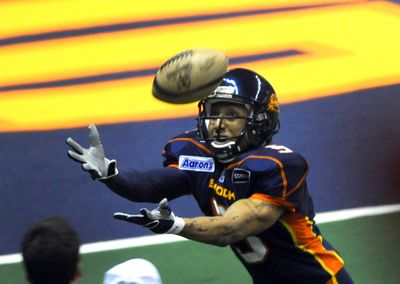No recession of affection

Year 4 of the Spokane Shock bolted from the blocks Friday night, as good a time as any to see if some of the shine was off the indoor carnival.
After all, it’s no longer the new game in town – and modern attention spans are as short as pay envelopes are light.
Yet other than a few hundred season-ticket holders, there didn’t seem to be much missing.
The cowbells and Thunderstix tormented any eardrums still scabbed over from last season. The orange jumpsuit guys in the upper deck turned anything behind them into obstructed-view seating.
Raul Vijil caught his usual four touchdown passes, and probably will each game until Year 2029.
That the winner of the meatball-eating contest managed to choke down just two did seem like a weak-sauce effort until it was reported they weigh in at a half-pound each. Still, we’ll want to see week-to-week improvement in that area.
The Shock grounded the Stockton Lightning 59-42 in the af2 opener at the Spokane Arena, and no one among the announced crowd of 10,548 seemed put out by the lack of drama. And while owner Brady Nelson thinks the honeymoon period for the franchise is long over, he’s not sure how you tell.
“It’s tough to put a number on that,” he admitted. “We’re still winning, we’re still selling out, but it’s different.”
Meaning that what was a civic buzz two or three years ago has settled into a happy hum.
Something else is different, though when it happened the stewards of af2 said it wouldn’t impact their league. In Spokane it has – but not for the worse.
Last December, the Arena Football League – the majors of indoor football to af2’s Triple-A – canceled its 2009 season to undertake a financial restructuring, or perhaps a collective brain transplant. Somehow, players a moon shot away from the NFL had come to pull in six-figure salaries and what once had been a charming diversion among the megasports had grown a little full of itself.
The tangible connections between the AFL and af2 are the name and the game – and the fact that the $200-a-night gladiators from the latter aspire to play in the former. And suddenly that carrot, for a year anyway, was gone.
Because of that, Shock version 4.0 is more like Shock 3.5. Thirteen players from last season’s ArenaCup finalists suited up Friday, an almost unheard of retention rate in a league with more on-and-off traffic than the 90 East Sprague bus.
“There are several players who would not be playing in Spokane right now if there was an AFL,” said Shock general manager Adam Nebeker. “Raul – you can’t say for sure, he might not have made the final roster but he had a contract. Sergio Gilliam, Nick Davila, Kevin McCullough – and probably a few more.”
Naturally, all were deflated when AFL pulled the plug on ’09.
“But when I heard, I knew right away I was coming back to Spokane because I wouldn’t play anywhere else in this league,” McCullough said.
That wasn’t just the feeling of the holdovers. Two new Shock standouts – defensive lineman Ben McCombs and defensive back Aaron Williams – were af2 all-stars for other clubs, but told Nelson if they had to play af2 it would only be in Spokane.
Now, the af2 talent level could have received a more substantial lift, but owners voted not to sign any 2008 AFL player during their furloughs.
“When the AFL went away, we’d already signed 35 guys to contracts for camp,” Nebeker said, “and we didn’t feel good about telling those guys, ‘Thanks, but we’re going to replace you with a bunch of AFL guys.’ And then a year from now, if they’re back in the AFL, we’d be begging these guys to come play for us.”
If the AFL somehow doesn’t return in 2010, of course, life in af2 could change permanently. The incentive to play for such a small stipend – moving up – would largely disappear, and retaining the best players could prove more difficult.
“But most of the guys we focus on are guys right out of college, or close to it,” Nebeker said. “What we provide them is not that much different from what they get in college – it’s not a huge lifestyle change. You’d probably see a smaller window for players willing to do that – guys wouldn’t be hanging on for as many years. But you’ll still have the guys who will do it for a year or two out of college, because the reality is they love playing football and it’s not that big of a sacrifice for them.”
In the meantime, Shock football seems as healthy as ever, the times notwithstanding. That 6,000 season tickets were renewed before the economy truly tanked and that many corporate sponsorships were existing multiyear deals certainly helped, but the fact is that while the club brings in more revenue than other af2 teams, it spends more, too, trying to keep the honeymoon feeling – even if it was over a couple of years ago.
“I think we have enough goodwill built up to survive a tough year – but nobody wants to watch a dog, either,” Nelson said. “Let’s put it this way – I don’t want to go 4-12 to find out.”